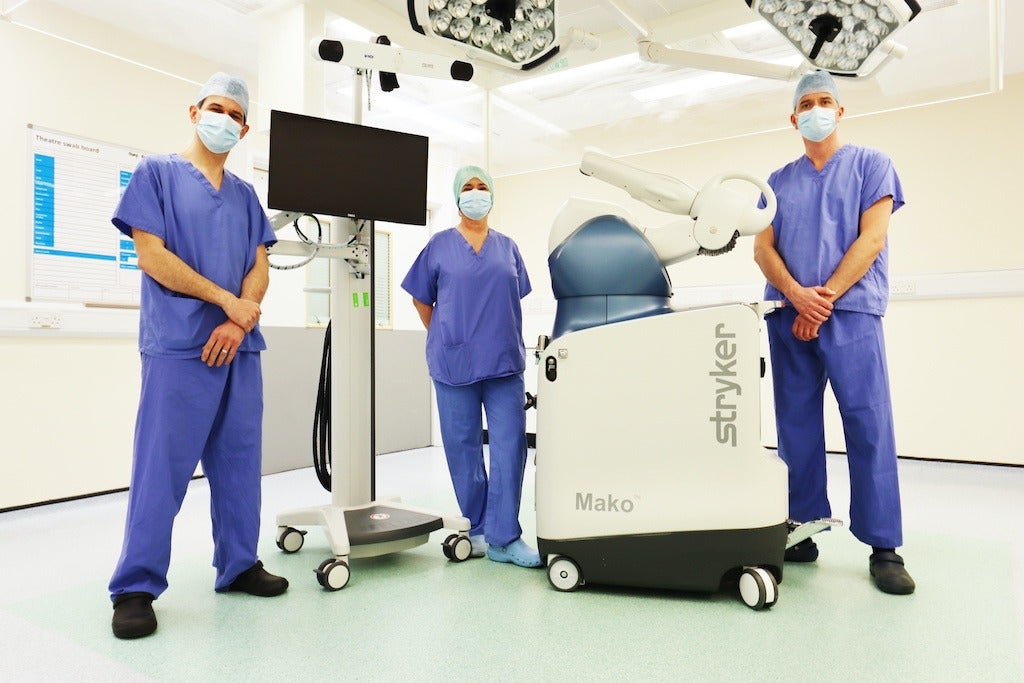
The UK’s National Institute for Health Research (NIHR) is to fund a £1.6m study into the use of robotic machinery to assist surgeons in performing knee replacement surgery.
The RACER (Robotic Arthroplasty: a Clinical and cost Effectiveness Randomised controlled trial) study will compare the use of surgical robots to standard instruments in an effort to determine which of the two techniques is best at improving patient outcomes and reducing pain following surgery.
The project will be jointly run between University Hospitals Coventry and Warwickshire (UHCW) NHS Trust, Warwick Medical School at the University of Warwick, and the Royal Orthopaedic Hospital (ROH) in Birmingham.
Mr Andy Metcalfe, from UHCW and Warwick Clinical Trials Unit at the University of Warwick, and Professor Ed Davis, from ROH are the study’s lead authors.
Mr Metcalfe said: “Can robots help surgeons perform knee replacements better? This is a really important question and we’re delighted that the NIHR has agreed to support the study.
“Surgeons are always working to improve the care we give and we’re seeing more robots in surgery now.
“This study is about whether using a robot gives better results for patients having knee replacements and we’re looking forward to being able to answer that.
“It is a big achievement for the team to be at the forefront of a world-leading multi-centre study like this, it is probably one of the most important questions in orthopaedic surgery right now. We’re really pleased to be able to get started.”
Professor Davis added: “We are excited to begin this incredibly significant study. It will help orthopaedic surgeons across the world to better understand the most effective tools and techniques when performing knee replacements.
“It will also help us to ensure patients enjoy the very best outcomes.
“The team have all worked incredibly hard during the pandemic to ensure this trial is safe and of the highest quality.
“We are all very keen to evaluate the evidence and share it as widely as possible.”
How will the robotic knee replacement surgery study be conducted?
Surgeons normally use instruments that provide pre-set angles to help them perform knee replacement surgery, but some surgeons have started using a robotic arm attached to a computer with a pre-prepared map of the leg to guide them.
Surgical robots are favoured by some for their precision and guidance, while standard instruments are preferred by others for their simplicity and ability to make greater use of surgeons’ skills and experience, without the added expense.
The team will invite patients to take part from six NHS hospitals across England and Scotland over the coming months.
The study will involve equal numbers of participants in each treatment group, so that a balanced and fair comparison can be made to find out which surgical technique results in better outcomes.
It will include asking questions that gauge the ability of knee replacement patients to do activities, as well as evaluating their quality of life in the long-term.
It will also delve into the financial side of the surgery to find out which method provides the best value for the NHS.
The robot used will be MAKO, made by medical device giant Stryker, which will be supporting the study with costs to ensure hospitals do not have to pay extra to take part.
When and where is the study being run?
Although the RACER trial opened at the end of December 2020, activity was delayed by the Covid-19 response, when most orthopaedic services were paused.
Some hospitals are now seeing patients again and the study is now accepting them into its first sites.
The Royal Orthopaedic Hospital in Birmingham and the Royal National Orthopaedic Hospital in Stanmore, London, are already open for recruitment.
But a number of other hospitals across the UK, including the Glasgow Royal Infirmary, the Royal Infirmary of Edinburgh, the Freeman Hospital in Newcastle, the Royal Devon and Exeter NHS Trust, and Portsmouth NHS Hospitals, are expected to open soon.






